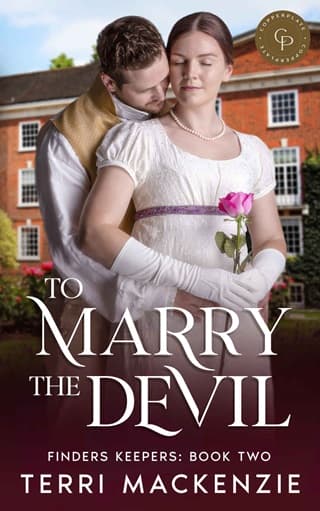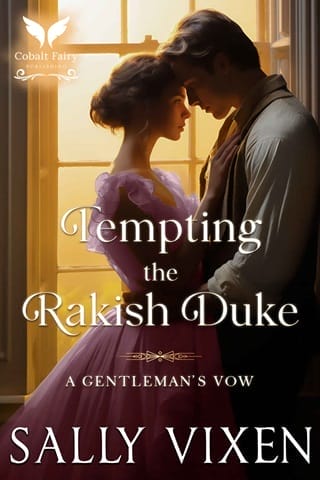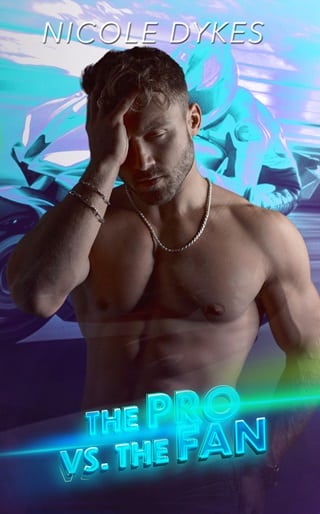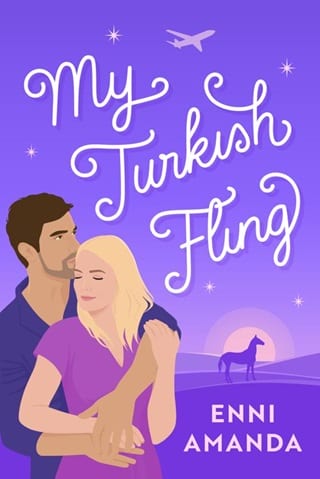Chapter Eleven
Jacob knew better than to agree to such a foolhardy arrangement. His plans for the future—disgracing the family name and ensuring it could not continue, which had been his purpose since Cecil had so thoughtlessly burdened him with the title—did not involve a wife.
But the way she had issued the challenge, as though she knew he would have no choice but to indulge her, intrigued him. And it was not as though it was an impossible task: she was pretty, when she remembered to smile, and most importantly, she was rich.
"If I were to agree," he said, holding up one finger, "you would have to also swear that you will accept the offer of an eligible gentleman."
"I would rather marry most men than you," she said with enough scorn that he believed her. Good. It was better they were on the same page. "But the gentleman must be eligible. And to my liking, at least a bit."
What she meant, no doubt, was not a man like Helmsley, and at the thought, his blood heated. He had not seen the man since their altercation in Vauxhall, and it was a good thing, or he might not have waited to issue a challenge before throwing the first punch.
His fists itched. Scum like that did not belong on the earth.
"Of course he would be . . . respectable," he said through gritted teeth. "And for you, I shall even be a rake reformed. The ton will be shocked to see how well you have won me over." Doing so would draw attention to her and her charms, which would be no bad thing, especially if she flirted with others. It would be a small sting to be seen as losing out to another, but he did not mind overmuch. "I have but one final request, little bird."
"What is it?"
He flashed her his most charming smile. "You must not fall in love with me."
She arched a single brow. "I hardly think that will be an issue."
"Then you have yourself a deal." He extended a hand, but she eyed it suspiciously, making no move to shake it. "What is it?"
"Are you sober?"
"As the grave."
"I believe this is the first time I have seen you so."
He nodded. "That is likely."
"If we are to do this, I think you should be sober more often. Around me, I mean," she added hurriedly. "As part of your reformed rake act."
He frowned. This was one of the many reasons he had never seriously courted anyone since Madeline—and even then, the way he had behaved had hardly consisted of courting. Having ladies come to him, keen to win him over, was far more satisfying, and required very little effort on his behalf.
But in order to make other gentlemen jealous, he would need to flaunt her and show them precisely what they were missing. And for that, he would have to pretend to be smitten with her.
"Very well," he said. "I shall remain sober while escorting you, and you may have all the flowers and trinkets your heart desires. And before the time is out, I will have a veritable line of gentlemen queueing for your hand in marriage."
Her brows drew together and one corner of her mouth curved into a smile that looked a little too cynical for her fresh, innocent face. "We shall see," she said.
With the agreement, no matter how foolishly made, in hand, Jacob paid a visit to Lady Louisa Bolton. They had met shortly after Madeline's death, when she was married to a much older gentleman she despised. In a fit of pique and heartbreak, they had briefly become lovers, but quickly came to the conclusion they were better as friends. And considering Villiers was all too happy to see the world burn as long as he made a bet on who held the torch, she was perhaps his only true friend.
He did not stop to examine how painfully tragic that was.
He found her painting in her drawing room, one brush behind her ear and her apron splattered with paint. When she saw him, she raised her eyebrows, putting her brushes down—all except the one behind her ear.
"Goodness, Jacob," she said, wiping her hands on a rag as she rose. "It's barely past noon."
"An achievement I agree," he said dryly, plucking the paintbrush from her head. "Is your mind disturbed, Louisa? You only paint when you're in a foul mood."
She gave him a dirty look. "It's none of your business."
"I'll take that as a yes."
She rang for tea. "I hear I have to offer you congratulations. Tell me, Jacob, what charms does she have that she enticed you into matrimony?"
He took a seat and stretched his legs out in front of him. "It is not real."
"Excuse me?"
"The engagement is merely a front to protect her reputation while I find her a more suitable husband."
Louisa stared at him for a few moments. "I think you should start from the beginning."
In as few words as possible, he explained the predicament they had found themselves in. At the mention of Helmsley's involvement, her face darkened with angry colour, and she squeezed the rag between her fingers as though it was his neck.
"Someone ought to put the man out of his misery," she said viciously.
He raised an eyebrow. "How bloodthirsty. Are you quite sure you're well?"
"Enough about me. Explain to me how you anticipate finding a more suitable husband than a marquess for the daughter of an earl."
"I presume you haven't forgotten my reputation."
She waved a dismissive hand. "All that can be forgiven. But tell me—was this your idea?"
He gave her a disparaging look. "Obviously."
"And she agreed?"
"Would I be here if she hadn't?"
She rocked back, eyes wide and a little glassy. "My God. She reminds you of Madeline."
He scowled, all the more irritated because she was right. "She does not. And if she did—only if, mind you—that would not change the fact she dislikes me. And I do not like her. This is a business arrangement."
Louisa, who had always been able to read him better than a book, raised an elegant brow. "A business arrangement you allowed yourself to be caught up in because she reminds you of Madeline. What is your plan?"
"The fact of the matter is, Louisa," he confided, leaning forward and resting his elbows on his knees, "I was hoping you might help me."
"Help you," she repeated. "With finding her a husband?"
"Naturally."
Louisa leant back in her seat and looked at him contemplatively. It was not a look he particularly enjoyed; it usually meant a conclusion he disliked was just around the corner.
"You have met her a total of four times," she said. "One of which you kissed her—"
"I did not know who she was then," he said, although that was only true for the first kiss. The second had been done in full knowledge of her identity, and while he occasionally felt a flare of shame, he could not bring himself to regret it.
"You do now. Tell me, Jacob, why do you not just marry her yourself?"
He stared at her. She stared back. Asking her for help had evidently been a mistake. "Because neither of us wants to be married," he said. "And particularly not to one another."
"That is all the reason you possess?"
"I hardly need more."
She threw up her paint-splattered hands. "Why do you need my help? You told Lady Annabelle that you could manage to find her a husband on your own."
He flashed her a grin. "On my own but with your help. You have more mobility than I, and you can introduce her to a selection of gentlemen who have a chance of being tempted into wanting her for their own. I'll be there to make them jealous, and you can spread the rumour that Annabelle would be open to another match with a more suitable gentleman. Et voila, the bargain is complete."
"And if we don't achieve this momentous task?"
"Well . . ." He paused over his words, contemplating. "She believes that after three months are up, if I haven't found her a husband, I'll marry her myself."
Louisa's grey eyes widened and she placed a hand over her heart. Then the same eyes narrowed. "You said believe."
"I won't, of course. But there's no need for her to know that. It won't come to pass."
"Jacob, you cannot be serious."
"Have you ever met her?" he asked, hooking his ankle on his knee and accepting the tea she now offered him. "It should be easy enough to pair her off. She probably has the largest dowry in the country."
Louisa's face twisted as she drank. "I know of her," she said after a moment. "Do you want me to befriend her?"
"She shares your opinion of me, so I expect you'll get on delightfully. And frankly she needs a friend. I hardly count."
"No," Louisa muttered. "You do not." She glanced at the painting in the corner of the room, which Jacob had almost immediately forgotten about in his preoccupation with his own news.
She sighed. "Annabelle Beaumont is Henry's sister."
It took a few moments for the words to penetrate and for Jacob to parse their meaning. Henry's name had been mentioned between them once before, shortly after their one and only moment of intimacy. And even then the mention of him had been brief—Henry Beaumont, the Viscount Eynsham, the future Earl of Shrewsbury, had been Louisa's first love.
It had ended badly and Henry had gone off to war. Everything Louisa had done in those early years, Jacob knew, was a form of revenge. She was older now, and more poised, but the hurt was still there, lingering in her heart like a bruise that had been pressed.
"You told me you never think about him," he said. He had never known any of the details, and now he itched to learn.
She directed a glare at him, her eyes sharp enough to cut glass. "That was before I heard he was coming back to London."
The announcement that Henry was returning from the war greeted Annabelle when she rose for breakfast. Her mother was already there, having made the walk to Norfolk House that morning, and she was full of the news.
"He writes that he's sorry he's been gone so long and he hopes to see us soon," she read from the letter clutched in her hands. Annabelle poured herself some tea and tried to recall everything she knew about Henry.
Seven years ago, when she'd been just thirteen, he had left to fight the French, and since then he had returned home rarely. When he had been here, he had argued with their father almost constantly, which made her stomach curl with worry.
As for what she remembered of him . . . he was so much older than her—by eleven years—that they had never played much together as children. She was closer with Oliver, her second brother who was currently at Cambridge; they were of a similar age.
Theo poured herself some coffee "Does he say when, Mama?"
"He gives no date, but I expect we can see him before the month is out."
Annabelle's stomach gave a little lurch. Once Henry was back, he might do things like force the marriage, or disapprove of her marrying one man after she was engaged to another.
"Will he be coming to London, do you think?" she asked cautiously.
Her mother frowned at her. "Well of course. This is where his family is, after all." She hugged the paper to her chest again. She was the kind of mother who, despite her attempts to hide it, rather obviously preferred one child over all others. Henry was her darling and had been since he was born, especially since she had lost many children after. Theo had been born a full ten years after Henry.
There was no doubt that their mother loved them all. But she unequivocally loved Henry the best.
Theo grinned at Annabelle from across the table, mouthing Mama's favourite. Annabelle did her best to smile back. She glanced at the clock. Jacob had promised to call on her that morning with a gift, and she was already, absurdly, nervous.
Their mother stayed a little longer, reading Henry's letter to them a total of three disjointed times, and exclaiming how good things would be once he was there, before finally leaving to spread the news elsewhere.
They ate the rest of their breakfast in near silence, Annabelle reading a book on her lap and Theo staring into the distance. After breakfast, Annabelle carried the same book into the drawing room and continued reading as Theo practised some scales on the pianoforte. Nathanial joined them, bringing in some of the work he usually did in his study and spreading it across the table. It was the picture of domestic bliss.
That was, of course, until the butler escorted a familiar face and a rather obnoxiously large bouquet of flowers into the room.
"Your Graces," the Marquess said with a devilish smile directed at Annabelle as he bowed. He offered the flowers to her, and Annabelle was aware of Theo's pursed lips and Nathanial's frown. She had told them of her intention to maintain the engagement, though she had not revealed her intention of marrying another, but neither had been pleased at the idea.
Only her mother had been happy at the news. But Annabelle could be marrying an octogenarian and if he was a duke, her mother would have been happy.
The Marquess's gaze was warm with false affection, but his smile was all wickedness, and her stomach flipped uncomfortably. She had thought when she was making the deal that she was doing the right thing, but seeing him here, now, with these flowers, sober and with every intention of appearing to woo her, she could not help thinking she had made a mistake.
 Fullepub
Fullepub 



